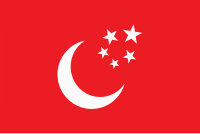This article has multiple issues. Please help improve it or discuss these issues on the talk page. (Learn how and when to remove these messages)
|
Felicity Party Saadet Partisi | |
|---|---|
 | |
| Abbreviation | SAADET (official) SP (unofficial) |
| Leader | Mahmut Arıkan |
| Founder | Necmettin Erbakan Recai Kutan |
| Founded | 20 July 2001 |
| Preceded by | Virtue Party |
| Headquarters | Ziyabey Cad. 2. Sk. No: 15, Ankara, Turkey |
| Newspaper | Millî Gazete |
| Youth wing | Genç Saadet |
| Membership (2024) | |
| Ideology | Millî Görüş[2] Islamism[3] Religious nationalism[4] |
| Political position | Right-wing[5] |
| National affiliation | Felicity and Future Alliance |
| Colours | Hot pink (customary) |
| Grand National Assembly | 10 / 600 |
| District municipalities | 1 / 922 |
| Belde Municipalities | 3 / 388 |
| Municipal Assemblies | 72 / 20,952 |
| Party flag | |
 | |
| Website | |
| saadet | |
The Felicity Party (Turkish: Saadet Partisi, SAADET) is an Islamist Turkish political party. It was founded in 2001, and mainly supported by conservative Muslims in Turkey.
It was founded on 20 July 2001 after the Virtue Party (FP) was banned by the Constitutional Court. While the party's reformist wing formed the Justice and Development Party (AKP), the hardliners founded the Felicity Party. Although an Islamist party, its policy platform covers the whole span of political issues in Turkey.
The Felicity Party's vote has been weakened by the success of the moderately Islamic Justice and Development Party government. It has repeatedly condemned the Turkish government's desire to join the European Union, and relationship with Israel and the United States. It has argued that Turkey must adapt its military and foreign policy stance to meet what it argues are increasing threats coming from the West to all Muslim countries. The Party's platform is based strongly around Necmettin Erbakan's ideas and philosophy.
- ^ "Saadet Partisi" (in Turkish). Court of Cassation. Retrieved January 10, 2022.
- ^ "Erdogan verliert vor der Türkei-Wahl den ersten Bündnis-Partner" (in German). 2023-03-27. Retrieved 2024-02-21.
- ^ Benjamin Bruce, ed. (2018). Governing Islam Abroad: Turkish and Moroccan Muslims in Western Europe. Springer. p. 25. ISBN 9781317755098.
Over the last years, it seems that Süleymancılar vote has increasingly become split between the far-right nationalist Nationalist Movement Party (Milliyetçi Hareket Partisi, MHP), the Islamist Felicity Party, and the AKP.
- ^ Necati Polat, ed. (2016). Regime Change in Contemporary Turkey: Politics, Rights, Mimesis. Edinburgh University Press. ISBN 9781474416993.
In the nationwide local elections in March 2004, the Islamonationalist Party of Bliss (or Felicity Party, Saadet Partisi, SP) representing the settled Islamist outlook in politics for some time, from which the AKP had departed abandoning its identity discourse for a wider slant, would sink to 4 per cent.
- ^ "Opposition Felicity and Future parties to form alliance for upcoming local elections". 13 August 2023.